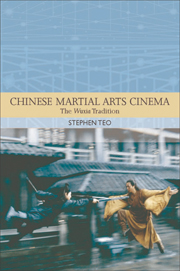Book contents
- Frontmatter
- Contents
- TRADITIONS IN WORLD CINEMA
- Acknowledgements
- Dedication
- Introduction
- 1 Wuxia from Literature to Cinema
- 2 Reactions against the Wuxia Genre
- 3 The Rise of Kung Fu, from Wong Fei-hung to Bruce Lee
- 4 The Rise of New School Wuxia
- 5 The Wuxia Films of King Hu
- 6 Wuxia after A Touch of Zen
- 7 Wuxia between Nationalism and Transnationalism
- Epilogue
- Glossary
- Bibliography
- Filmography
- Index
6 - Wuxia after A Touch of Zen
Published online by Cambridge University Press: 05 August 2013
- Frontmatter
- Contents
- TRADITIONS IN WORLD CINEMA
- Acknowledgements
- Dedication
- Introduction
- 1 Wuxia from Literature to Cinema
- 2 Reactions against the Wuxia Genre
- 3 The Rise of Kung Fu, from Wong Fei-hung to Bruce Lee
- 4 The Rise of New School Wuxia
- 5 The Wuxia Films of King Hu
- 6 Wuxia after A Touch of Zen
- 7 Wuxia between Nationalism and Transnationalism
- Epilogue
- Glossary
- Bibliography
- Filmography
- Index
Summary
This chapter examines the development of the wuxia film in the period following A Touch of Zen, perhaps the first true masterpiece in the genre though it did not receive the critical recognition it deserved when first released. The film was a box-office failure in Taiwan following its release in two instalments in 1970 and 1971. In Hong Kong, it was cut down to a single two-and-a-half-hour movie, and released in 1971, in the wake of Bruce Lee's box-office sensation The Big Boss. It too flopped, thus signalling the rise of the kung fu phenomenon and the end of the new school wuxia cycle.
The box-office failure of A Touch of Zen had major repercussions for the Taiwan film industry. Sha Yung-fong has admitted that Union's financial problems really stemmed from the massive investment it poured into A Touch of Zen and its box-office failure. Although Union continued to make wuxia movies, the company soon diversified its product line by churning out melodramas with contemporary settings, recognising that the wuxia film was no longer a commercial proposition and that another action genre, namely the kung fu movie, had replaced it. Union produced a few kung fu movies in 1971–1973, such as Jimmy Wang Yu's Heibai dao (The Brave and the Evil, 1971) and Nü quanshi (A Girl Fighter, 1972), both starring Hu's discovery from Dragon Inn, Shangguan Lingfeng, but never reaped the expected financial bonanza and in 1974, the studio closed down its production component.
- Type
- Chapter
- Information
- Chinese Martial Arts CinemaThe Wuxia Tradition, pp. 143 - 171Publisher: Edinburgh University PressPrint publication year: 2009



